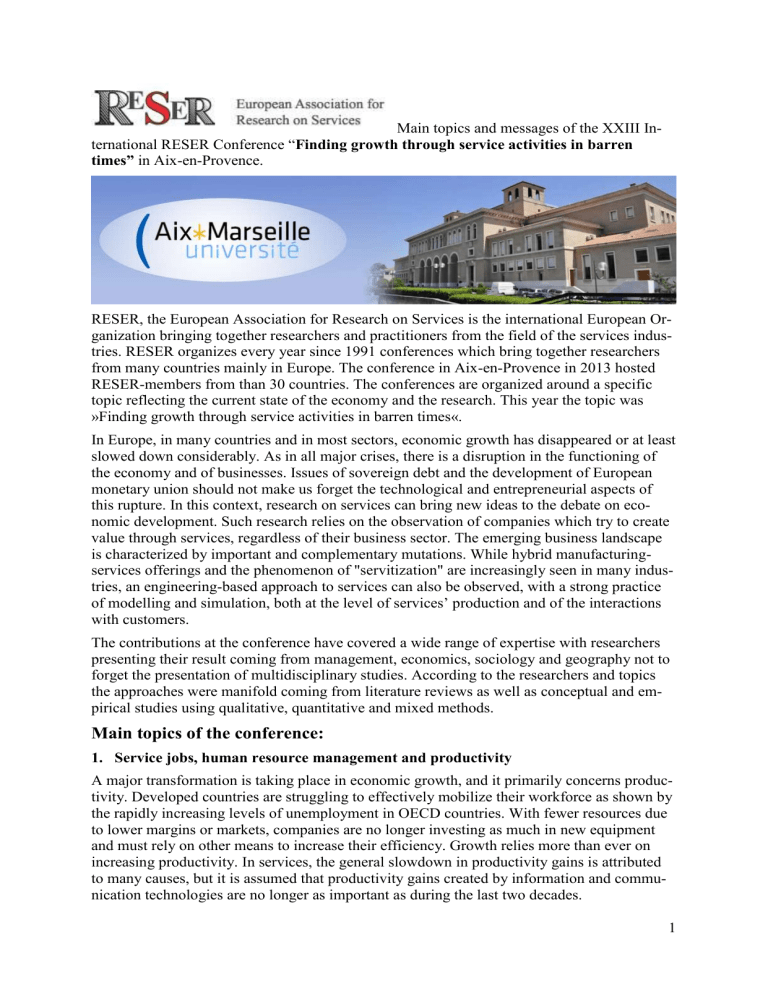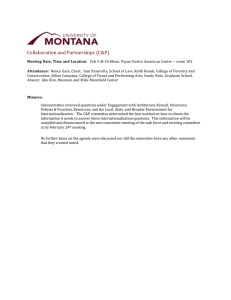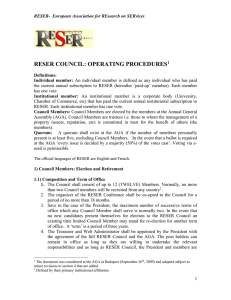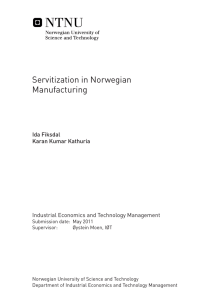main-topics-of-the-xxiii-international-reser-conference.docx

Main topics and messages of the XXIII International RESER Conference “
Finding growth through service activities in barren times” in Aix-en-Provence.
RESER, the European Association for Research on Services is the international European Organization bringing together researchers and practitioners from the field of the services industries. RESER organizes every year since 1991 conferences which bring together researchers from many countries mainly in Europe. The conference in Aix-en-Provence in 2013 hosted
RESER-members from than 30 countries. The conferences are organized around a specific topic reflecting the current state of the economy and the research. This year the topic was
»Finding growth through service activities in barren times«.
In Europe, in many countries and in most sectors, economic growth has disappeared or at least slowed down considerably. As in all major crises, there is a disruption in the functioning of the economy and of businesses. Issues of sovereign debt and the development of European monetary union should not make us forget the technological and entrepreneurial aspects of this rupture. In this context, research on services can bring new ideas to the debate on economic development. Such research relies on the observation of companies which try to create value through services, regardless of their business sector. The emerging business landscape is characterized by important and complementary mutations. While hybrid manufacturingservices offerings and the phenomenon of "servitization" are increasingly seen in many industries, an engineering-based approach to services can also be observed, with a strong practice of modelling and simulation, both at the level of services’ production and of the interactions with customers.
The contributions at the conference have covered a wide range of expertise with researchers presenting their result coming from management, economics, sociology and geography not to forget the presentation of multidisciplinary studies. According to the researchers and topics the approaches were manifold coming from literature reviews as well as conceptual and empirical studies using qualitative, quantitative and mixed methods.
Main topics of the conference:
1.
Service jobs, human resource management and productivity
A major transformation is taking place in economic growth, and it primarily concerns productivity. Developed countries are struggling to effectively mobilize their workforce as shown by the rapidly increasing levels of unemployment in OECD countries. With fewer resources due to lower margins or markets, companies are no longer investing as much in new equipment and must rely on other means to increase their efficiency. Growth relies more than ever on increasing productivity. In services, the general slowdown in productivity gains is attributed to many causes, but it is assumed that productivity gains created by information and communication technologies are no longer as important as during the last two decades.
1
Important changes are also occurring at the level of management. Organization charts inherited from the 19th century are competing with more flexible organizations where employees have more room to maneuver while being highly accountable for results. In services to households, maintaining productivity gains relies on the ability of companies to mobilize their workforces, to raise skills of their partners and providers, to develop friendly customer relationships (with a real link between staff and customers) and to create short and effective customer journeys. In knowledge-intensive services, communication, interaction and negotiation skills become increasingly important as these services develop. These trends affect both commercial and non-commercial services. In most services, standardization of tasks requires a reorganization of activities that can be automated and centralized. Finally, strategies for innovation in services require a particular human resource management to select the right people that will be able to communicate internally and externally and to build a compensation system rewarding creativity.
The complexity of a continuing creation of jobs in and with the help of the services was reflected in the heterogeneity of the contributions in the level of the analysis (macro, sectoral, firm level, cases studies), the research approach (conceptual, methodological, empirical), the various service industries being dealt with ( industrial services, health, social services, hotels).
The main topics were: spillover effects of service innovation on employment; the design of service jobs and skill needs; the measurement of service productivity; the service processes; the hospital sector in barren times; a sustainable value creation; the time dimension in the evaluation of service productivity, etc. The research is centered on the productivity of industrial services, which is pointing to the crucial role of services in upgrading and transformation of manufacturing. Especially German researchers are in the forefront of research of productivity in services which highlights the interest and also a sustained funding of this kind of research from the local business community. A comparable minor role in this context played the perspective of employment asking to what extent the improved productivity by and in services can create or destroy jobs and what kind of jobs that will be.
2.
Moving from service innovation to innovating through a Service-Dominant Logic
(SDL)
Research on innovation in services has gradually moved away from the technological or industrial model of innovation and focused on the specificities of innovation in service activities. This stream of research has been the subject of several RESER research programs and presentations or workshops at past RESER conferences. Recently, it has been enriched with a new conceptual approach, termed the "Service-Dominant Logic", which considers services less as a category of activities but more as being representative of a global perspective on value creation. This perspective is based on the concepts of exchange value and use value, in addition to its interest in the design of manufacturing and sales processes, the approach highlights the fact that the source of value creation consists in the ability to recognize and meet needs of consumers. Such vision echoes the early work on the service economy that has emerged in the 1980s and can also be linked to more recent research on sustainable development.
The contributions by the RESER-teams concerning this topic showed that modern economies are characterized by a rise of servitization, in a general context of a Service-Dominate Logic
(SDL). In order to stay competitive, manufacturing firms add services to their products servitization is understood and executed by the business sector not as a mechanical process which just consists in adding services to goods. Servitization is much more, namely the addition of intangibles i.e. skills, information, interactions and knowledge, the changing of the business-model, the organization, the management practices and the culture and the taking into account of the whole life cycle of the product. Servitization is not a homogeneous pro-
2
cess. The main sub-sectors addressed are capital goods industries, machine tool builders and the wind power industry.
The SDL is (also) a theory of innovation in services as it addresses the question of the nature of innovation in services which sometimes produce the innovative dimension of goods. It is important to notice in this context that there is no need to address innovation in services in contrast to innovation in manufacturing (demarcation).
The SDL is a theory of the management of service innovation processes as innovation not anymore linear, stage-gate, planned, intra-firm but cooperative, interactive (networked) and non-necessarily formalized. It has also been highlighted in the presentations and discussion of the conference that there’s an innovation gap in public services for example in the relationship between environmental scanning and innovation in hospitals. Another point resulting from the discussions of the conference was the impression that social innovation and social entrepreneurship are not yet clear concepts with rather vague definitions. It has been suggested that an increased interaction between the service literature and the social innovation literature may help. It has been encouraging to see that emergent and developing countries are also the locus of interesting service innovation dynamics. Finally in the context of service innovation it has been shown the importance of the service encounter as a major locus of innovation. But as an important caveat it has been put forward that the troubles with the measurement of productivity and innovation are far from being solved and future evaluations should perhaps using multicriteria approaches.
3.
New services, network services and new service organizations
The current economic difficulties also have technological roots. Digital transformation affects key areas of activity and represents a real revolution. All businesses are impacted but not at the same speed or to the same degree. This digital transformation of the economy gives way to the emergence of new entrepreneurs and new organizations. It includes the traditional sector of ICT, software and computer services companies, telecommunications, as well as the
Internet sector and other creative industries. It also appears in the somehow surprising development of robotics in services, simulation and interaction models that have been grouped under the terms "Service Science". Service engineering integrates the structures, processes and skills to deliver innovative services to the largest number in the most reliable fashion. Relationships with suppliers are also changing and supply chains are increasingly becoming platforms from which all partners can benefit.
These new services are driven by entrepreneurs who face the traditional challenges of business creation, but must also develop interactive skills as many services are developing in networks and in more or less formal alliances. Such networks give access to additional resources and can improve profitability. A careful attention to consumers’ needs can also create opportunities for new lucrative and successful businesses even in traditional sectors. Diversification can also be an effective tool as it opens new horizons and, when it is successfully implemented, allows companies to boost sales. For instance, entrepreneurs in the 'low cost' sector show that there are considerable margins for more productivity in services. These entrepreneurs offer a totally redesigned and more effective organization, where the simplicity of the offer is a factor in reducing costs and guaranteeing lower prices for the consumer. The organization focuses on jobs directly related to the service, resulting in the reduction of hierarchies. At the same time, Internet use is widespread. The question arises whether this customer-based advantage will erode over time with the development of the necessary bureaucracy to manage success. One may ask whether there is a cycle of services, like the "wheel of retailing”: the advantages that have led to the birth of the company disappearing at the end of the cycle under the effects of gentrification and bureaucratization of operations.
3
For this theme, focusing on the company in its relations with its environment, a widespread variation of papers has been presented, concerning, among other things: s uccess factors of new organizational forms for services, such as franchise networks, cooperatives or strategic alliances, the logistics of the reorganization of industrial relations, new approaches based on service modelling and engineering, the brand development and management of service networks etc.
The focus of the presentations at the conference has been mostly laid on the relationship of industrialization and standardization on the one hand and productivity on the other. In some respect services have come closer to manufacturing than before with the focus having turned to the service encounter. The keywords in this context have been “productivization and engineerization” which means for example the growing importance of a systematization of innovation activities with respect to market perspective, service engineering technologies, logistics and multichannel (ICT) delivery and production. In this stream of debate in the conference the question of how an increase in service productivity may be helpful in overcoming the economic crisis has come-up as well. Not surprisingly, it has been concluded that more research has to be done whether it helps to overcome the crisis. Preliminary answers contained in the various presentations coming forward were the importance of networking particularly between employers, the intermediary role of KIBS and the importance of franchising – new topic. A discussion theme for the future remains: How can we prove that service research really helps in overcoming barren times?
4.
Internationalisation: the new frontier for services development?
One of the main developments of the 1990’s was the acknowledgement of the importance of service activities in international trade. The General Agreement on Trade and Services
(GATS), the North American Free Trade Agreement (NAFTA), the “single market” in Europe and the deregulation of public and private services have brought to light the existence of an international trade in services and created rules for this trade. Whether the strategic dimension for the firm or the theoretical problems generated by services in the international trade analysis are concerned, a wide interest exists in the internationalisation of services that is now amplified by the new opportunities created by the development of information and communication technologies. These recent technologies greatly increase the potential of trade for service firms and favour the internationalization process of service firms. Thanks to these technologies, even the smallest service firm in some domains can reach far-distant markets, virtually prospect them and deliver services with low investments and no travelling costs. These technologies also enable easier control procedures with distant established partners or subsidiaries and swifter exchanges of information, which are necessary to implement such strategies.
In the sessions of the RESER-conference the internationalization of Services has been addressed in its broader dimensions, challenges and consequences. In the macro perspective the contributions found a strong correlation between services development and economic growth: investing in services could be in the benefit of the convergence of economies. There was also seen a strong correlation between the global competitive position of an economy and its position in terms of service related factors. KIBS, in particular, have a significant contribution in enhancing technology transfers and inducing innovativeness to their client industries, thus increasing competitiveness and the readiness for internationalization in the benefit of the economy. Developing economies can procure from abroad high value services that will fuel the economic dynamism and can also valorize better their own distinctive competences on foreign markets.
The trade related perspective stated one more time that the trade in services is increasing with the liberalization of the trade in services (GATS) but is still lagging behind trade in goods.
Some of the papers in this stream of reasoning have concentrated on special types and groups of countries. So was for example shown for the Visegrad-countries that increased trade in
4
services contributes to the tertiarisation of the economies and the import of KIBS in particular contributes to the internationalization of the effects of the tertiarisation. Furthermore, fast growing economies (BRICs) show a large diversity of evolutions and achievements in their trade of services following liberalization. For instance Brazil seems to profit from specialization in several knowledge intensive service activities, whereas a more active participation of
Russia in the trade of services, and business services in particular is still to be achieved in the future). Evidence was provided that trade in goods might have a leveraging effect on the trade in services, while, at least in the case of Romania the correlation was found to be insignificant.
The cultural perspective of the internationalization of services must not be underestimated.
The culture of the recipient country may determine the choice of business models (which brings into discussion the organizational adaptability of the internationalized company). The use of foreign employees oblige organizations to address multiculturalism by establishing new forms of organizations, adapted motivational tools, forms of education and training (case studies from Sweden, Denmark have been presented). And finally, internationalized companies have to prepare their staff to working as expatriates in a foreign country (the example of
Brasil has been discussed in this context).
Regarding the pronounced international character of RESER it has been seen in the discussion by members to be able to contribute in promoting the Single European Market for services not only as primarily an European Research Association, but also as a network or forum where important contributions on the topic can be brought from other regions of the world.
5.
Services activities and urban and regional service restructuring
The relationships between service activities, economic revival, and urban and regional restructuring constitute a multi-level question. For innovation, the local links between industrial services and manufacturing are essential to build clusters, to encourage creativity networks and to foster innovation. Many regions have tried to establish regional innovation policies with mixed results, because the local demand in services, particularly knowledge intensive services, is not balanced with local supply. The deficit in business services impedes not only innovation in but also the internationalization of manufacturing services, allowing them not to compete effectively.
Research studies on urban development have brought much evidence about the relationship between urban growth and localization of service activities. Urbanization and the shift towards services are general, but not all cities have the same capacity to face the future. Business services, particularly knowledge intensive services, appear very clearly to be the drivers of growth of major cities, but are at the same time an impediment to the development of secondary cities which are not able to attract these services.
Economic development is not only a matter of firms and jobs but also the result of creating a city where people want to live. The physicality of cities is still a very important dimension depending on the physical organization of cities and infrastructure: proximity, face-to-face interaction with business counterparts is still necessary and commuting needs increasingly efficient transport systems. Zoning, densities, traffic congestion, greenhouse gas emission are major issues for developers but also for urban people who will decide more and more concerning their own localization on these criteria. Services are at the heart of these questions because they are an integral part of the management of the cities and a lever to attract people and firms. The aspects discussed in the presentations at the conference have covered services and green development, cultural and recreation activities, clusters and local development, urban services and the urban local development. The main streams were on the one hand spatial/geographic approaches and regional/local/urban development issues on the other. Not
5
surprisingly, the contributions to the discussion brought forward at the conference were partly based on consolidated research issues like the hybridity of value creation in services (tangibility), the geographic organization/spatial patterns, clustering effects, KIS (business, consumer), innovation processes (types, models), stakeholders interaction (private, public, etc.) and not to forget urban/regional/local development policies and planning.
But the papers presented showed also considerable diversity of research objects and approaches: eco/green services, cultural/recreational services, transport/distribution and urban / social functions (care, proximity). Different kinds of knowledge are determining the character of the regional evolution. When it comes to services they are generally knowledge intensive.
Among the services important for the regional aspects intermediation functions like facilitating, reputation building, gatekeeping, and others are important.
As challenges for future studies about the role of services in urban and regional service restructuring are seen:
The issue of the scale of the analysis (e.g. on clustering processes: EU vs N America vs
Asia).
The issue of transversality (non-sectoral approach, the awareness of new dimensions of knowledge based services with fluid/diffuse/transversal concepts, e.g. green, culturalcreative; tourism-recreation; distribution).
The Issue of informality (non-market mechanisms, untraded interdependencies, e.g, care, cultural, urban management).
The issue of plurality of rationalities (market but also non-market; public action; cooperative/shared actions; hedonic or lifestyles oriented action; e.g. use conflicts management, artistic, care).
The issue of different kinds of knowledge building/dissemination mechanisms.
The issue of intermediation and gatekeeping processes (importance of legitimization, reputation building process).
The issue of conflict/cooperation (importance of conflict; driven by conflict; articulation of interests, in public and private actions).
And finally, the issue of sensibility to funding agendas (e.g. EU vs regional/local agendas).
Regarding the links to policy and the articulation with governance mechanisms and with the actors of policies important influences have been seen in the level and scale of articulation and intervention (regional/local/national /supra-national).
Coming back to the main question of this 23 rd
RESER conference “Finding growth through service activities in barren times” the members specializing in regional research in services underlined the great importance of the interaction of the different stakeholders at the different levels of economic activity and the setting of conditions by public authorities.
6



